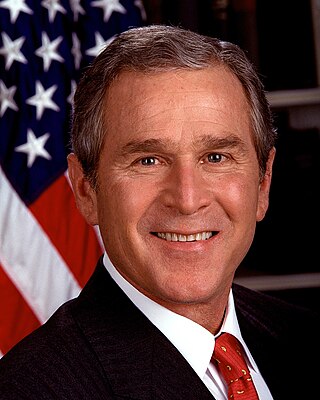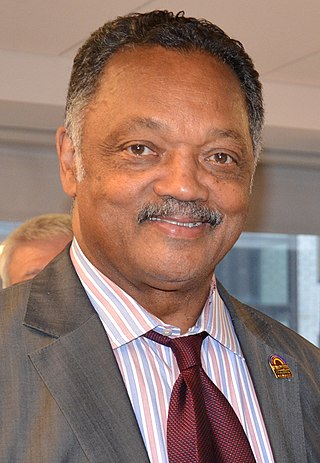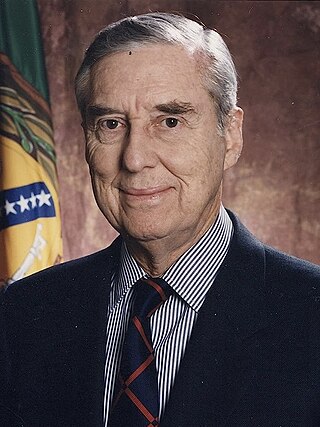Announcement
On April 11, 1987, Senator Gore of Tennessee announced his candidacy. He stated that he believed he could offer, "clearer goals" than the other candidates. [1]
Gore was further described by The New York Times as:
solidly built, dark and indisputably handsome. He has a powerful sweet tooth but keeps his weight under control by running several miles a day at dawn. His stump speaking is erratic, one night spirited and evocative and the next flat and routine. He is an indifferent platform joke-teller but can be a raconteur and mimic of some skill in the privacy of his chartered campaign plane. National analysts make Senator Gore a long-shot for the Presidential nomination, but many believe he could provide a natural complement for any of the other candidates: a young, attractive, moderate Vice Presidential nominee from the South. He currently denies any interest, but he carefully does not reject the idea out of hand. [2]
At the time of the announcement, Senator Gore was 39 years old, making him the "youngest serious Presidential candidate since John F. Kennedy." [2]
Campaign
According to CNN, Gore ran his campaign as, "a Southern centrist, [who] opposed federal funding for abortion. He favored a moment of silence for prayer in the schools and voted against banning the interstate sale of handguns." [3] In addition, CNN notes, "in 1988, for the first time, 12 Southern states would hold their primaries on the same day, Super Tuesday.
As the only other Southern candidate, Gore chose to criticize Jackson often. Gore began to criticize Jackson for his Mid-East policies. [4] In particular, "Albert Gore Jr. assailed Mr. Jackson's foreign policy views and said he was 'dismayed' by Mr. Jackson's 'embrace of Arafat and Castro'." [5] Jackson responded by stating that, "The issue is not whether the Israelis and Palestinians are moral equivalents. Both of them are human beings and both are trapped in the cycle of death and pain. And they are trapped in the cycle of mutual annihilation. I wanted to offer leadership that will move from mutual annihilation to coexistence to break the cycle of death." [5] Gore was heavily criticized for his attacks against both Jackson and Dukakis. [6] Jackson also retracted some of his previous statements. [7] It was Gore who first mentioned the Massachusetts furlough program Dukakis had supported as Governor by asking him questions in a debate right before the 1988 New York primary, about "weekend passes for convicted criminals"; this later developed into the Willie Horton pro-George H. W. Bush attack ad. [8] However, unlike commonly believed, Gore did not mention Horton by name. [8]
During the Democratic debate, Gore argued that his foreign policy platform was different from his rivals, but they disagreed. "'I reject Gore's efforts to try to pin labels,' Representative Richard A. Gephardt of Missouri told reporters after the event." [9]
Jackson defeated Gore in the South Carolina Primary, winning, "more than half the total vote, three times that of his closest rival here, Senator Albert Gore Jr. of Tennessee." [10] Gore next placed great hope on Super Tuesday [3] where they split the Southern vote: Jackson winning Alabama, Georgia, Louisiana, Mississippi and Virginia; Gore winning Arkansas, North Carolina, Kentucky, Nevada, Tennessee, and Oklahoma. [11] [12]

The 1988 United States presidential election was the 51st quadrennial presidential election held on Tuesday, November 8, 1988. The Republican nominee, incumbent Vice President George H. W. Bush, defeated the Democratic nominee, Governor Michael Dukakis of Massachusetts.

Richard Andrew Gephardt is an American attorney, lobbyist, and politician who represented Missouri's 3rd congressional district in the United States House of Representatives from 1977 to 2005. A member of the Democratic Party, he was House majority leader from 1989 to 1995 and minority leader from 1995 to 2003. He ran unsuccessfully for the Democratic nomination for President of the United States in 1988 and 2004. Gephardt was mentioned as a possible vice presidential nominee in 1988, 1992, 2000, 2004, and 2008.

From January 14 to June 8, 2004, voters of the Democratic Party chose its nominee for president in the 2004 United States presidential election.

Super Tuesday is the United States presidential primary election day in February or March when the greatest number of U.S. states hold primary elections and caucuses. Approximately one-third of all delegates to the presidential nominating conventions can be won on Super Tuesday, more than on any other day. The results on Super Tuesday are therefore a strong indicator of the likely eventual presidential nominee of each political party.

From February 10 to June 9, 1992, voters of the Democratic Party chose its nominee for president in the 1992 United States presidential election. Arkansas Governor Bill Clinton won the nomination through a series of primary elections and caucuses culminating in the 1992 Democratic National Convention held from July 13 to July 16, 1992, in New York City.

The 1992 presidential campaign of Bill Clinton, the then-governor of Arkansas, was announced on October 3, 1991, at the Old State House in Little Rock, Arkansas. After winning a majority of delegates in the Democratic primaries of 1992, the campaign announced that then-junior U.S. senator from Tennessee, Al Gore, would be Clinton's running mate. The Clinton–Gore ticket defeated Republican incumbent President George H. W. Bush and Vice President Dan Quayle in the presidential election on November 3, 1992, and took office as the 42nd president and 45th vice president, respectively, on January 20, 1993.

From February 8 to June 14, 1988, voters of the Democratic Party chose its nominee for president in the 1988 United States presidential election.

From January 24 to June 6, 2000, voters of the Democratic Party chose its nominee for president in the 2000 United States presidential election. Incumbent Vice President Al Gore was selected as the nominee through a series of primary elections and caucuses culminating in the 2000 Democratic National Convention held from August 14 to 17, 2000, in Los Angeles, California, but he went on to lose the Electoral College in the general election against Governor George W. Bush held on November 7 of that year, despite winning the popular vote by 0.5%.

The 2004 presidential campaign of Howard Dean, 79th Governor of Vermont, began when he formed an exploratory committee to evaluate a presidential election campaign on May 31, 2002. Dean then formally announced his intention to compete in the 2004 Democratic primaries to seek the Democratic Party's nomination for President on June 23, 2003. Dean dropped out of the race in February 2004 after a poor showing in the Wisconsin primary.

The 1988 Jesse Jackson presidential campaign was Jesse Jackson's second campaign for President of the United States. This time, his successes in the past made him a more credible candidate and he was both better financed and better organized. Although most people did not seem to believe he had a serious chance at winning, Jackson once again exceeded expectations as he more than doubled his previous results, prompting R. W. Apple, Jr. of The New York Times to call 1988 "the Year of Jackson".

From January 24 to June 6, 2000, voters of the Republican Party chose its nominee for president in the 2000 United States presidential election. Texas Governor George W. Bush was selected as the nominee through a series of primary elections and caucuses culminating in the 2000 Republican National Convention held from July 31 to August 3, 2000, in Philadelphia, Pennsylvania.

Jesse Louis Jackson is an American civil rights activist, politician, and ordained Baptist minister. Beginning as a young protégé of Martin Luther King Jr. during the civil rights movement, Jackson maintained his status as a prominent civil rights leader throughout his political and theological career for over seven decades. He served in the United States Senate from 1991 to 1997 as a shadow delegate for the District of Columbia. Jackson is the father of former U.S. Representative Jesse Jackson Jr. and current U.S. Representative Jonathan Jackson.

The 1988 United States presidential election in Louisiana took place on November 8, 1988, as part of the 1988 United States presidential election. State voters chose ten representatives, or electors to the Electoral College, who voted for president and vice president.

The 1988 United States elections were held on November 8 and elected the President of the United States and members of the 101st United States Congress. Republican Vice President George H. W. Bush defeated Democratic Governor of Massachusetts Michael Dukakis. Despite Dukakis' defeat, the Democratic Party built on their majorities in Congress.

The 1988 United States presidential election in Arkansas took place on November 8, 1988. All fifty states and the District of Columbia, were part of the 1988 United States presidential election. State voters chose six electors to the Electoral College, which selected the president and vice president.

The 1988 United States presidential election in Tennessee took place on November 8, 1988. All 50 states and the District of Columbia were part of the 1988 United States presidential election. Tennessee voters chose 11 electors to the Electoral College, which selected the president and vice president. Tennessee was won by incumbent United States Vice President George H. W. Bush of Texas, who was running against Massachusetts Governor Michael Dukakis. Bush ran with Indiana Senator Dan Quayle as Vice President, and Dukakis ran with Texas Senator Lloyd Bentsen.

The 2016 presidential campaign of Mike Huckabee, the 44th Governor of Arkansas, began on May 5, 2015, at an event in his hometown of Hope, Arkansas. Huckabee's candidacy for the Republican nomination in the 2016 presidential election was his second, after having previously run in 2008. Following a disappointing showing in the Iowa caucuses, Huckabee ended his run on February 1, 2016.
Since 1983, the Democratic Party of the United States holds a few debates between candidates for the Democratic nomination in presidential elections during the primary election season. Unlike debates between party-nominated candidates, which have been organized by the bi-partisan Commission on Presidential Debates since 1988, debates between candidates for party nomination are organized by mass media outlets.

This article lists those who were potential candidates for the Democratic nomination for Vice President of the United States in the 1988 election. Massachusetts Governor Michael Dukakis won the 1988 Democratic nomination for President of the United States, and chose Texas Senator Lloyd Bentsen as his running mate. Dukakis chose Bentsen in order to appeal to Southerners and in hopes of carrying Bentsen's home state of Texas. The strategy failed, as the Dukakis-Bentsen ticket went on to lose Texas and all other states in the South except West Virginia. The choice of Bentsen caused some backlash from Jesse Jackson, who had wanted to be chosen as the vice presidential nominee, and progressives such as Ralph Nader. Paul Brountas, a longtime Dukakis aide, led the search for Dukakis's running mate. The Dukakis–Bentsen ticket would lose to the Bush–Quayle ticket in the general election. Bentsen simultaneously ran for reelection as Senator, and easily won, despite the Dukakis-Bentsen ticket's double-digit loss in Texas.




















